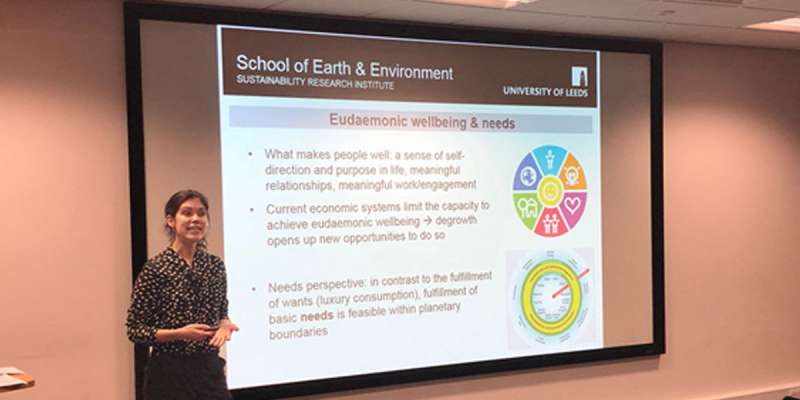Degrowth is the key to tackling climate change – but it won't be easy

If we want to tackle climate change and protect our future on the Earth, societies will need to adopt a degrowth model, in which we consume less, and use fewer materials and resources. Given how reliant we are on the growth model this won't be an easy transition.
Two researchers in the U.K. and Sweden have been awarded the latest Atlas Award for examining this current and growing debate on the strategy to tackle climate change from the degrowth angle. Selected by an international scientific committee, Dr. Milena Büchs, University of Leeds, U.K. and Prof. Max Koch, Lund University, Sweden received their award at a climate debate in Lund, Sweden this week. Their article appears in Futures, published by Elsevier. The Atlas award recognizes research that can (or already has) significantly impacted people's lives around the world.
While degrowth doesn't mean going back to a prehistoric way of life, it does mean reducing our consumption. To make the model work, we need to understand its impact on people's wellbeing, and therefore the concerns they might have about degrowth. This approach is dramatically different to the growth model that most countries around the world have adopted, and because of this, changing to a degrowth model may have far-reaching consequences.
"People aspire to buy a house, have a car and fly on really exotic holidays; these are the expectations that we grew up with," said Dr. Büchs explaining the close link between consumption and people's identities. "I think this will be the change that is required, to not see consumption of material goods and services as something that can fulfill our need to have an identity and some kind of status in society. The question is how that can be addressed in zero carbon ways."
In the paper, Dr. Büchs and Prof. Koch explore the concerns people have about the impact degrowth could have on their wellbeing in the short- to medium-term. The broader links degrowth has to our culture and society also have implications for wellbeing that might hinder its adoption; many of society's welfare-related institutions rely on the growth model: the education system; the labor market; and the legal system, for example.
Changing all this would be an unprecedented undertaking, but it's vital to our very survival, according to Dr. Büchs and Prof. Koch. "If we don't understand the potential implications of degrowth on people's wellbeing, it will never become a reality," said Dr. Büchs. "We need the public's support for this, which requires a lot of discussion and cultural change."
The researchers are planning further research in this area, including looking at engaging people in the transition, so they can better understand the concerns and overcome the barriers. Research will help understand the thresholds within which we can live—the minimum amount of consumption, resource use or travel, and how we will satisfy our basic needs and what is the maximum level the planet can support within the limitations of climate change.
"If we don't do anything, if we just carry on as usual, very soon our survival will be under threat," said Prof. Koch. "One of the counter-arguments to degrowth is that 'degrowthers' want to make people poorer and that this would have negative wellbeing implications; I think what one would need to make clear is that everybody's wellbeing will be undermined by climate change if we don't act on this now."
More information: Milena Büchs et al. Challenges for the degrowth transition: The debate about wellbeing, Futures (2018). DOI: 10.1016/j.futures.2018.09.002
Provided by Elsevier




















